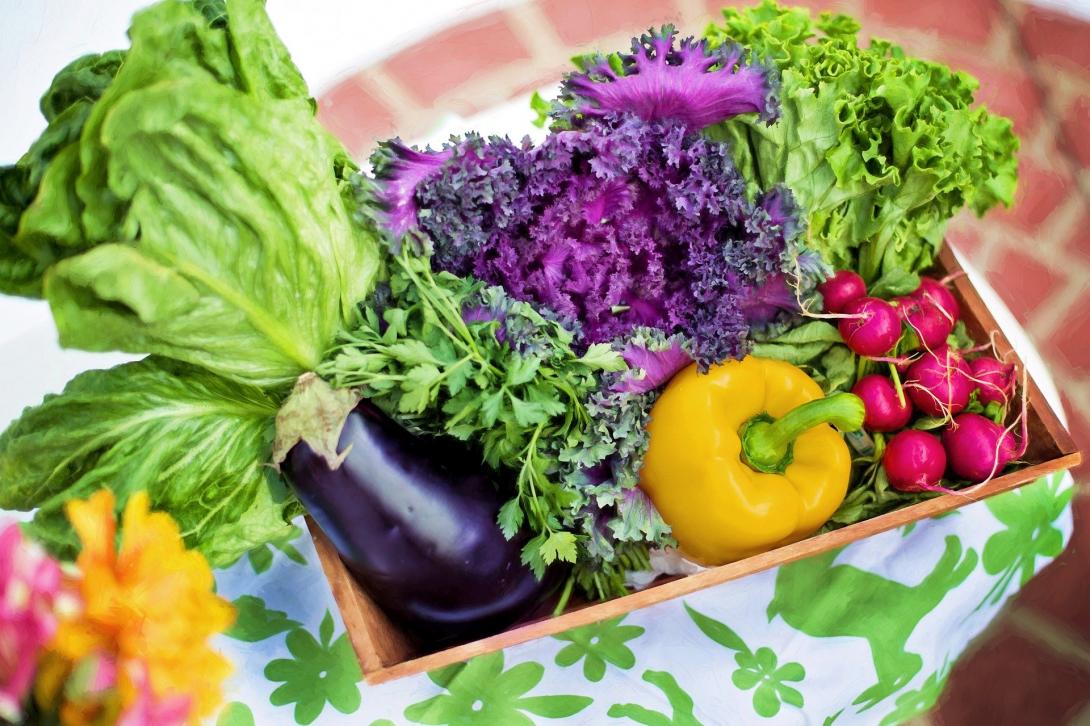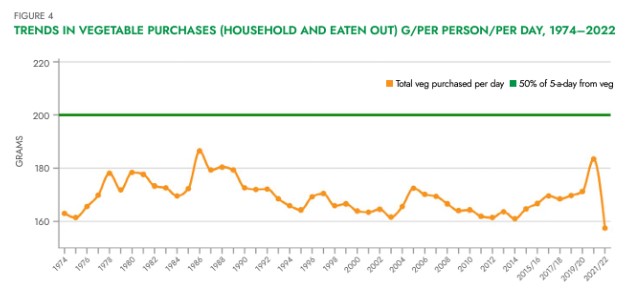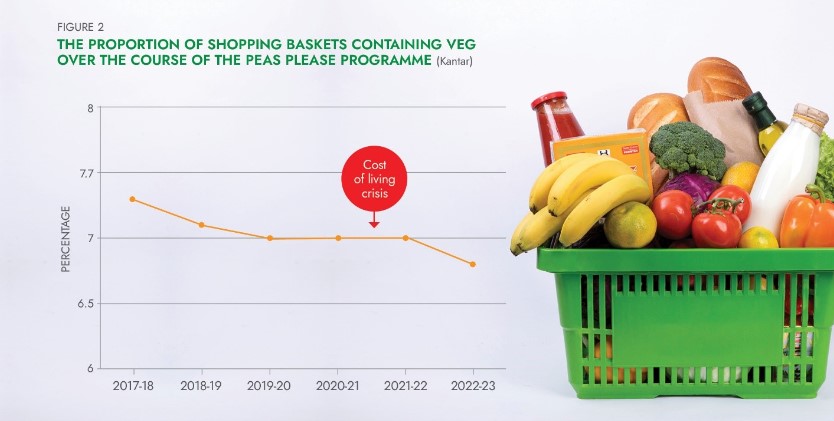04 December 2023
Cost of living crisis results in lowest vegetable purchases for 50 years

Cost of living crisis results in lowest vegetable purchases in the UK for 50 years
Peas Please, an initiative led by The Food Foundation with partners Nourish Scotland, Food Sense Wales, Nourish NI and Food NI, has found that the amount of vegetables being bought by households in the UK has fallen to its lowest level in 50 years.
The analysis of Defra data, conducted for the 2023 Peas Please Progress report, published today, shows that the cost of living crisis continues to impact on diets with the lowest income households struggling to afford healthier options.
Defra’s Family Food Survey captures purchases of food by UK households from both retail and the Out of Home sector and includes vegetables in composite foods as well as those bought whole.
Although vegetable purchases have been fairly stagnant for the past thirty years, purchases of vegetables dropped to their lowest level in fifty years in 2021-2022 (from 182g per person per day in 2020-21 to 154g in 2021-22), suggesting that the cost of living crisis is having a profound impact on household purchasing habits and dietary health.

Source: Adjusted National Food Survey data 1974–2000, Expenditure and Food Survey 2001-2002 to 2007 and Living Costs and Food Survey 2008 onwards, Family Food Survey 2022. Around 5,000 households in the UK are surveyed annually.
To be in line with the Eatwell Guide, the Government’s recommended guideline for a healthy diet, 20% of diets should be made up of vegetables.
Separately, The Food Foundation’s analysis of Kantar data provided annually to the programme reveals that not only does the volume share of vegetables purchased from retailers fall far below this, the figure is also moving in the wrong direction.
The weight of the average shopping basket that is composed of vegetables has fallen from 7.2% to 6.8% over the past six years.

The proportion of shopping baskets containing veg over the course of the Peas Please programme (Kantar data provided to the Peas Please initiative)
Inequality in vegetable consumption continues to be a serious concern, with veg consumption following a strong income gradient even before the cost of living crisis.
The Kantar basket data for the 2022-23 reporting year shows that on average, for those earning less than £10,000 a year, just 5.9% of their shopping basket consisted of veg compared to 8.2% for those earning over £70,000 a year.
Vegetables are the golden thread connecting diets that are both healthier and more sustainable, and there would be huge benefits for our health, the environment, and the UK’s economy if we were all able to hit the recommendations for vegetable consumption.
Transitioning UK diets towards more sustainable and healthy dietary patterns should be firmly on the political and corporate agenda as we get closer to the UN’s 2030 Sustainability Development Goals with vegetables playing an important role in supporting both human and planetary health.
The Peas Please project launched in 2017 with a clear mission to make it easier for everyone in the UK to eat more veg.
Since then, 110 organisations, from restaurant chains, caterers and manufacturers to growers and retailers, have committed to veg pledges that support the public to be able to access more veg.
Pledges have included everything from boosting the amount of veg contained in ready meals to serving more veg options on children’s menus. The project has led to an additional 1.1 billion additional portions of veg being sold or served.
Rebecca Tobi, Senior Business and Investor Manager, The Food Foundation says: "The Peas Please programme has shown just how much can be achieved by creating a diverse community of supporters working together to champion food system change – in this case making it easier for everyone to eat more veg.
"Although our report shows that those businesses who have supported the programme have achieved a huge amount – selling an additional 1.1 billion portions of veg – there is still much more that needs to be done for the UK to become a veg eating nation.
"With some 17 million households living with food poverty many are likely to be cutting back on healthier foods such as fruit and vegetables given that these are a more expensive source of calories in comparison to other food groups.
"We urgently need to see businesses stepping up to make eating veg the easy and affordable option, and more support from the Government to ensure that everyone is able to access and afford a healthy diet."
NOTES TO EDITORS
Please contact Juliet Grant on 07929075489 or email juliet.grant@foodfoundation.org.uk
AVAILABLE FOR INTERVIEW
Rebecca Tobi Food Foundation senior business and investor engagement manager
SOCIAL MEDIA
Twitter: @Food_Foundation
Instagram: food.foundation
ABOUT PEAS PLEASE
A trail-blazing initiative focused specifically on veg, Peas Please aims to bring together farmers, retailers, restaurant chains, caterers, processors and government departments with a common goal of making it easier for everyone to eat veg. Committed to collaborative working, Peas Pease is led by project partners The Food Foundation, Nourish Scotland, Food Sense Wales, Food NI, and Nourish NI who have secured engagement and support from over 150 organisations in cities, business and Governments across the UK to bring about change to the whole food system to improve people’s health and wellbeing. For more information about Peas Please, click here
The partnership is funded by the National Lottery Community Fund, the largest funder of community activity in the UK, who have made this work possible.
KANTAR DATA
The Kantar data used monitors the proportion of the average shopping basket that is made up of veg, with data provided to the Peas Please programme since 2019. The figure includes sales of fresh, frozen, chilled, prepared and canned vegetables bought across all the major retailers as well as in independent and bargain stores. Kantar data captures retail grocery sales only and does not include veg served by caterers and casual dining chains in the OOH sector, nor vegetables sold directly to citizens, for example through veg box schemes. It also excludes vegetables contained within composite products such as ready meals where we know many retailers are making progress. Nevertheless, although not a complete picture of British vegetable purchasing, these figures show that there an urgent need for retailers to continue to better promote and commit to increasing sales of veg if we are to achieve the recommendations in the Eatwell Guide.
ABOUT THE NATIONAL LOTTERY FUND
The partnership is funded by the National Lottery Community Fund, the largest funder of community activity in the UK, who have made this work possible.
ABOUT THE NATIONAL LOTTERY COMMUNITY FUND
We are the largest funder of community activity in the UK – we’re proud to award money raised by National Lottery players to communities across England, Scotland, Wales and Northern Ireland. Since June 2004, we have made over 200,000 grants and awarded over £9 billion to projects that have benefited millions of people. We are passionate about funding great ideas that matter to communities and make a difference to people’s lives. At the heart of everything we do is the belief that when people are in the lead, communities thrive. Thanks to the support of National Lottery players, our funding is open to everyone. We’re privileged to be able to work with the smallest of local groups right up to UK-wide charities, enabling people and communities to bring their ambitions to life.
ABOUT THE FOOD FOUNDATION
The Food Foundation is a charity working to influence food policy and business practice, shaping a sustainable food system which makes healthy diets affordable and accessible for all. We work in partnership with researchers, campaigners, community bodies, industry, investors, government and citizens to galvanise the UK’s diverse agents of change, using surprising and inventive ideas to drive fundamental shifts in our food system. These efforts are based on the continual re-evaluation of opportunities for action, building and synthesising strong evidence, convening powerful coalitions, harnessing citizens’ voices and delivering impactful communications.


